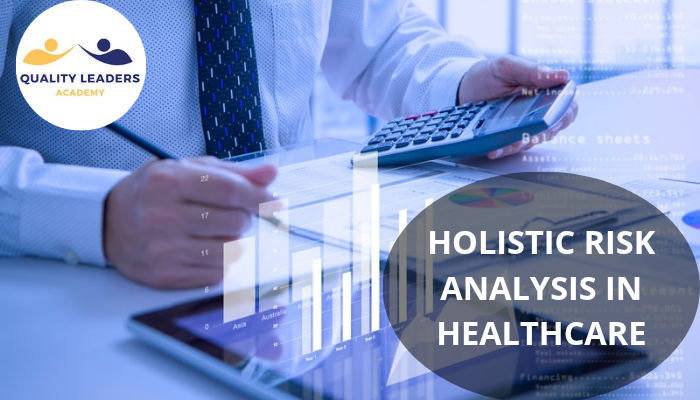In today’s fast-paced healthcare environment, the complexity of risks has evolved. Healthcare systems must manage a broad spectrum of risks, including operational, clinical, financial, and regulatory threats. The holistic risk analysis approach has emerged as a comprehensive framework to manage these risks effectively. This article explores the importance of a holistic approach in healthcare, its methodologies, and its application for improving patient safety and organizational performance.
WHAT IS HOLISTIC RISK ANALYSIS IN HEALTHCARE?

Holistic risk analysis in healthcare is a methodology that evaluates and addresses all potential risks within a healthcare system, considering both internal and external factors. Unlike traditional risk management techniques, which might focus solely on individual areas (e.g., clinical, operational), a holistic approach integrates various risk domains. This method ensures that all risk aspects, including human, technological, financial, and regulatory risks, are evaluated and mitigated.
A holistic risk management model provides a complete view of the healthcare organization's challenges. By focusing on interconnected risks, this strategy helps healthcare providers develop comprehensive solutions that enhance patient safety, improve operational efficiency, and reduce financial losses.
KEY COMPONENTS OF HOLISTIC RISK ANALYSIS IN HEALTHCARE
Clinical Risks
Clinical risks involve patient care and treatment-related threats, such as medical errors, misdiagnoses, or adverse drug reactions. A holistic approach incorporates clinical governance frameworks to ensure patient safety protocols are followed rigorously and systematically across all levels of care.
Operational Risks
These include risks that can affect the day-to-day functioning of a healthcare facility, such as equipment failure, staffing shortages, or inefficiencies in hospital administration. Effective healthcare operations risk management ensures resources are optimally allocated, workflows are streamlined, and contingency plans are in place for unforeseen disruptions.
Regulatory Risks
Healthcare providers face numerous compliance and regulatory requirements from entities such as the Joint Commission, the Centers for Medicare and Medicaid Services (CMS), and local government bodies. A holistic risk analysis ensures that the organization complies with healthcare standards and regulations to avoid penalties, legal actions, and potential reputational damage.
Financial Risks
Financial risk refers to the potential loss of income or increased costs due to various factors, including billing errors, fraud, or uncompensated care. A holistic approach includes evaluating economic sustainability, cost-management strategies, and improving financial practices within the healthcare system.
Technological Risks
In an increasingly digital world, healthcare organizations are heavily dependent on technology. Data breaches, cyberattacks, and system outages represent significant technological risks. Holistic risk analysis incorporates IT infrastructure, cybersecurity measures, and disaster recovery planning to ensure data integrity and operational continuity.
WHY IS HOLISTIC RISK ANALYSIS IMPORTANT IN HEALTHCARE?
A holistic risk analysis is vital because it:
Improves Patient Safety:
By evaluating all aspects of risk, healthcare providers can create a safer environment for patients, reducing the occurrence of preventable errors.
Enhances Decision-Making:
A comprehensive view of risks allows healthcare leaders to make more informed decisions, from budgeting to strategic planning.
Supports Regulatory Compliance:
Regular risk analysis helps healthcare organizations stay compliant with changing laws and regulations, minimizing legal and reputational risks.
Optimizes Resource Allocation:
Holistic analysis ensures that resources are allocated where they are most needed, ensuring efficiency across the system.
RISK MANAGEMENT METHODOLOGIES IN HEALTHCARE

To implement holistic risk analysis effectively, healthcare providers often use the following methodologies:
Failure Mode and Effect Analysis (FMEA)
FMEA is a systematic technique for pinpointing potential points of failure in a system or process and evaluating the severity of their effects. This proactive method helps organizations identify areas at risk and implement preventive actions before failures occur.
Root Cause Analysis (RCA)
RCA is a method used to determine the underlying causes of incidents or problems. It helps healthcare providers understand why an issue happened, rather than just addressing the symptoms. For example, if a medication error occurs, RCA can identify contributing factors such as communication breakdowns or process inefficiencies.
Risk Probability and Impact Assessment
This approach helps healthcare organizations assess the likelihood and impact of various risks. By evaluating the probability of different events and their potential consequences, healthcare providers can prioritize risks and implement appropriate mitigation strategies.
HOLISTIC RISK ANALYSIS EXAMPLE IN HEALTHCARE
A healthcare system implementing holistic risk analysis might begin by performing an organization-wide risk assessment. This could include a review of clinical care processes, an audit of financial systems, an IT infrastructure assessment, and a survey of staff satisfaction and patient safety protocols.
After identifying key risks, the organization would implement a series of preventive and corrective actions. For example, if high clinical risks are identified in emergency room procedures, the organization could enhance training for medical staff and improve communication between healthcare providers.
Similarly, operational risks might lead to upgrading medical equipment, while financial risks may prompt a review of billing practices or the adoption of new revenue-cycle management tools. Each of these measures would be informed by the holistic risk analysis.
Finally, Holistic risk analysis in healthcare provides a comprehensive framework for managing a wide array of risks that healthcare organizations face. By addressing risks from multiple angles, clinical, operational, regulatory, financial, and technological, healthcare providers can develop more effective strategies to improve patient care, optimize resources, and safeguard the organization’s long-term sustainability.
As healthcare becomes increasingly complex, adopting a holistic risk management approach ensures that organizations are better prepared to face challenges, minimize potential harm, and maintain high standards of care. Implementing robust risk management processes not only protects the healthcare organization but also promotes a culture of safety, trust, and efficiency for both patients and staff.
Read also:
CPHRM CERTIFICATION REQUIREMENTS
CPHRM ELIGIBILITY REQUIREMENTS
Resources:
https://www.healthcarecompliancepros.com/risk-assessment-healthcare?utm_source=chatgpt.com
https://www.researchgate.net/publication/369649800_A_New_Holistic_Risk_Analysis_Approach_Based_on_the_House_of_Quality



